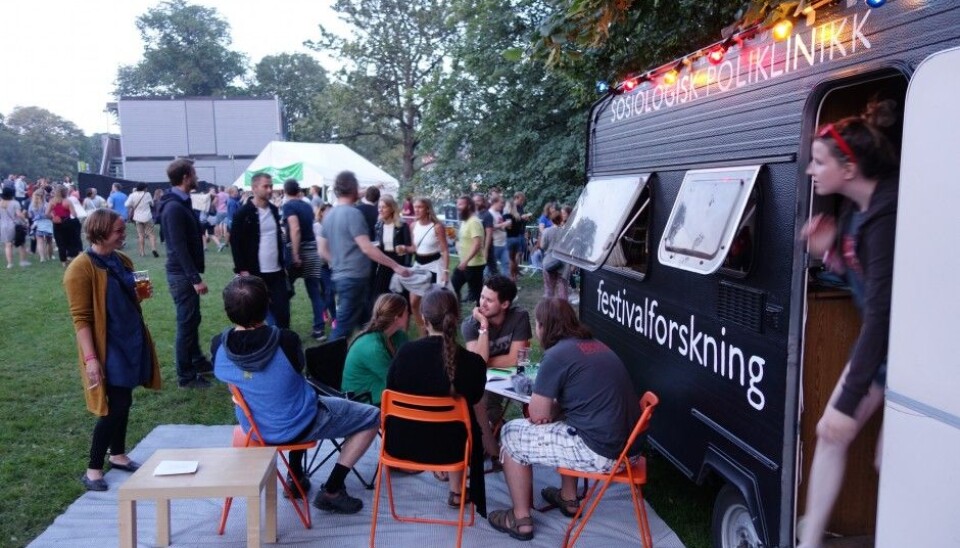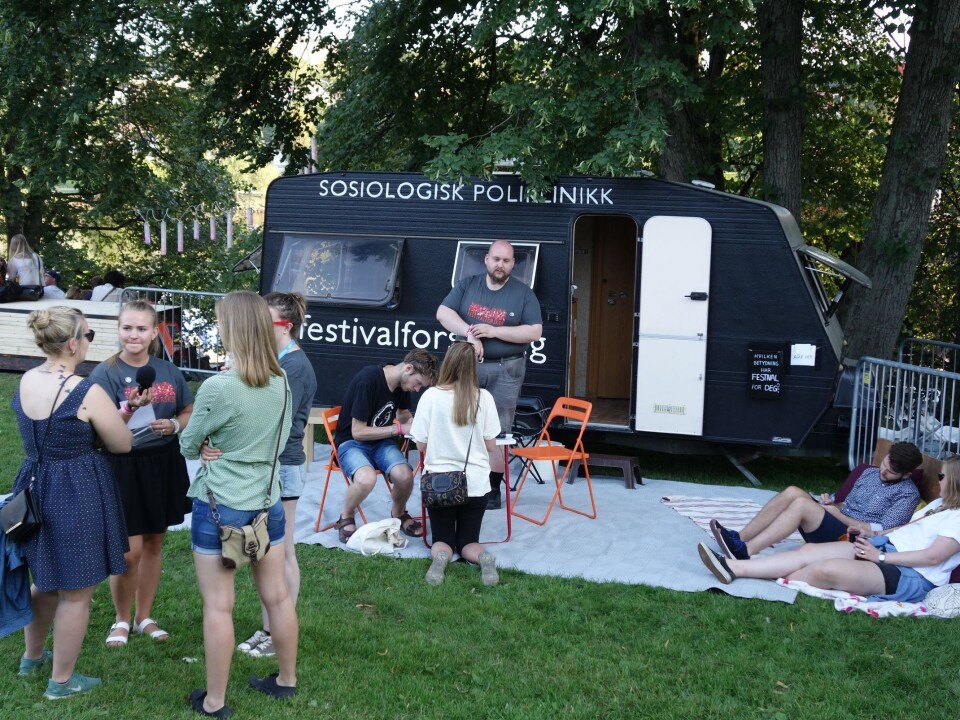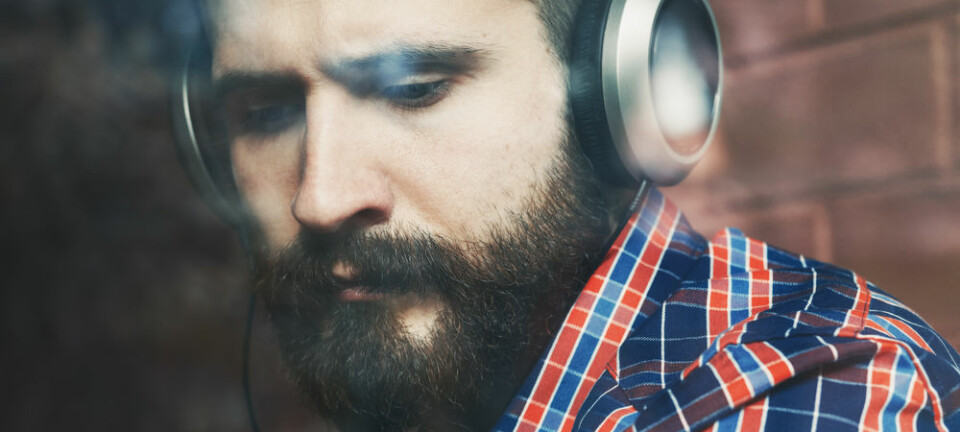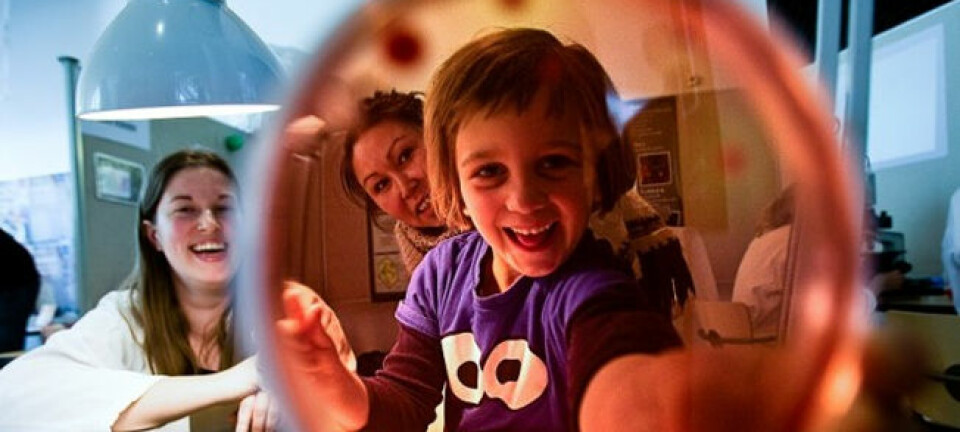
Getting in the groove at music festivals
Festivalgoers are drawn in by the great atmosphere. But what creates that atmosphere?
"Everyone was there, jumping and dancing around, and it was just that mood, and I felt like, ‘Wow!’"
"You’re sort of with everyone at the festival, not only the group you're with, but everyone else, too."
Euphoric festivalgoers try to explain what makes the atmosphere at music festivals so great.
Putting that into words isn’t always easy, says Aksel Tjora, a professor at the Norwegian University of Science and Technology (NTNU) and head of the Sociology Polyclinic, an academic working group.

People are “able to describe sitting on the grass in the park with others, the music, the beer, and getting a little drunk,” he tells forskning.no.
But the festival atmosphere is more than the sum of these elements, Tjora believes.
Along with several other sociologists he tried to figure out just what that was. In the summer of 2015 he rolled into the middle of Trondheim’s Pstereo Festival in a caravan with five of his colleagues from the Sociology Polyclinic.
They set up a research-camp to talk with the festivalgoers and soak up the atmosphere. In two days they conducted 91 interviews with 128 participants, averaging five minutes each.
Something bigger than yourself
Tjora thinks the best part of having a good time at a festival is hanging around with others and not doing anything. People “move in herds from stage to stage without having to think about themselves,” he says.
People get a break from everyday life and get caught up in something bigger than themselves. It feels good to be in sync with others.
Nothing matters when you’re lying on the grass in the sun and drinking a cold beer. The artists onstage are less important. “The program plays a very small role – but it has to be good enough,” says Tjora.
Participants talk about freedom, fellowship and joy.
The researchers put on their sociological lenses to really get a handle on the festival mood.
They found four elements that they believe create a festive atmosphere: taking a break from everyday life, a different way of being together, unwritten rules for how to behave, the environment and unusual dynamics that together create that special experience.
Collective effervescence
So have the researchers been able to put their finger on what this unique mood consists of? It boils down to some fairly obvious explanations, like that it feels good to be with others.
Tjora admits that’s true, but other sociological studies show that this isn’t anything new. On the contrary, festivals fit right into the range of other collective experiences.
This is where the concept of effervescence comes in, a term that originated with Émile Durkheim, one of sociology’s founders. He studied religious meetings and found that individuals no longer see themselves when they connect to something greater than themselves. This experience can impart a feeling of “bubbly joyfulness” to participants.
The festival atmosphere also creates a kind of sacred setting, according to Tjora and his colleagues.
“A collective sense of community can arise, where everyone behaves like everyone else. Participants feel held up by this strong fellowship, similar to what happens in closed religious communities.
Experiencing communitas
In another project, Tjora is trying to find out what communitas – this personal experience of togetherness – means. It's partly about recognizing yourself in others. You behave the same way they do, and vice-versa, without really knowing who started it.
Olaf Aagedal at the Institute for Church, Religion, and Worldview Research (KIFO) thinks the conclusions from the study are interesting and has found similar results in his own research, including at the Storås music festival in Trondheim.
“Festivals establish a sort of alternate reality where you find a mood, a spontaneity and a fellowship that doesn’t exist outside,” he tells forskning.no. He thinks the researchers have described the magic of festivals pretty aptly.
Being in the liminal zone
“It's amazing how quickly first-timers learn how to behave at the festival,” says Tjora. The anticipation starts long before the actual festival.
The festival is like society in miniature, which is created by how we mimic each other. It happens when you step into the liminal zone, a temporary condition where what you’re used to disappears and something new arises.
Tjora says some people think the special festival atmosphere happens because social norms disintegrate. “But the standards can actually be as narrow as one finds in everyday life – just slightly different,” he says.
In many ways, festivals represent a unique situation that social scientists find interesting to study so they can better understand "normal" social life.
Not all idyllic
Different rules at festivals can provide a sense of freedom, but also create problems.
Lots of alcohol at the Pstereo Festival contributes to the festive atmosphere and loosens up the participants, according to the researchers. Some get drunk and lose all inhibition.
But what about those who don’t care to drink?
“Alcohol may help remove social barriers. But it creates a distinction between those who drink and those who don’t,” says Aagedal.
He thinks the NTNU researchers should have done more research on how drunkenness affects the festival mood and those who are not part of the drinking crowd.
Many families feel excluded from the Holmenkollen ski festival due to so much alcohol, he says. And at the Storås music festival, which was known for its liberal stance on nudity, some volunteers no longer wanted to be involved when a striptease was added to the program.
Aagedal believes conflicts often occur in creating alternate realities and that the study of the Pstereo Festival paints a somewhat overly idyllic picture.
“Participants say everyone is welcome, but I don’t believe it,” he says. “If you don’t know anyone there or don’t know the expected social codes, it’s not that easy. That’s how it is with almost all types of communities – for someone to be included means someone has to be excluded.”
Aagedal points out that even the unifying, emotional solidarity that followed the terrorist attacks in Norway on 22 July 2011 created discomfort for some, as expressed anonymously on his research website.
Study should also seek out less happy participants
He thinks the festival researchers should have also sought out participants who didn’t enjoy the festival atmosphere. Their perspective could help identify what contributes to feeling a part of things.
Although the researchers circulated around the festival grounds, it was largely up to the participants to come over to the caravan to be interviewed, with the result that this was not a random sample of participants.
Aagedal believes that probably the participants who were the most excited came over to be interviewed. The researchers could have been more critical of how this would affect their results.
Research camp
Tjora and other researchers presented some of their conclusions about the festival mood in the 2013 book Festival! But this time Tjora and his colleagues adopted a somewhat special method.
The aim of the research caravan was to create a place for researchers to interview participants in peaceful surroundings, where the event was happening. Often they also had short interviews outside the caravan, where coffee, biscuits, soft pillows and blankets lured people over.
Festivalgoers who drink alcohol can create challenges when doing research in the midst of the event, so the researchers decided to end the interviews by nine o'clock in the evening.
“We're not going to interview people who are intoxicated, because they need know what they’re doing and saying. But a couple of beers don’t pose a problem,” says Tjora.
Last summer the caravan was also on hand at the festival. This time researchers strolled around and had more chance to observe what participants were actually doing. Their study analysis is still in the works, but they expect the focus will be slightly different from when they had participants talk about the festival atmosphere two years ago.
-------------------------------------
Read the Norwegian version of this article at forskning.no
































